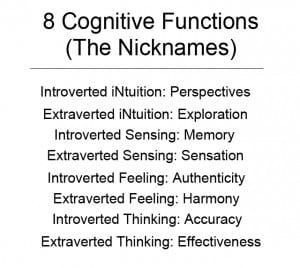 A word of warning: This post is primarily for Myers-Briggs and personality psychology geeks (of which I count myself one). If you’re new to personality types, this may or may not be interesting to you. Feel full permission to abort mission at any point.
A word of warning: This post is primarily for Myers-Briggs and personality psychology geeks (of which I count myself one). If you’re new to personality types, this may or may not be interesting to you. Feel full permission to abort mission at any point.
When I first started learning about personality types and, in particular, Myers-Briggs approximately 20 years ago (+/- a couple of years), the most accessible work on the subject was a book called “Please Understand Me” by the late David Keirsey.
It was pretty revolutionary for me, and started me on a path of obsession that I haven’t quite been able to shake two decades later. Very quickly I realized that the information was powerful, but it was also relatively limited. It was GREAT for understanding the 16 Myers-Briggs personality types, and I mastered those types as best I could.
I entered a space I see a LOT of people enter: I became an ‘expert’ at knowing people’s type descriptions and fancied myself an expert at being able to label others. It was a warm, self-satisfied place which gave me a sense of mastery and may or may not have prevented me from creating true intimacy with others. I vetted them based on the boxes I put them in, all the while thinking how awesome I was.
(Not everyone who learns personality types does this. My own personality type has a tendency to run to arrogance in any cognitive mastery, and I’ve had no choice but to let life beat the condescending asshole out of me. I’m a little spongy and bruised, but a much better person for it.)
At a certain point I started to abandon Myers-Briggs, realizing that my relationship with it wasn’t entirely healthy and I might be better off not typing other people, but just accepting them as they present.
Then I ran into another Myers-Briggs enthusiast and learned cognitive functions, and the world of typology burst open for me again. I became obsessed again, learned everything I could, did my own “think tanking” around the subject and once again gained a certain level of true mastery. But this time I wasn’t as arrogant overall, and I didn’t use it as a weapon to yield or a shield to hide behind.
I read everything I could, and of course – like you probably have – I started joining Myers-Briggs communities where everyone was using shorthand to reference cognitive functions and I felt ‘at home’.
Except, I wasn’t at home. In fact, in the course of a year I realized I HATED online forums around Myers-Briggs. Now, admittedly, as an ENTP I was on a lot of NT sites, which happen to be filled with the kind of arrogance that make a bad name for all NTs. The NF forums were a much softer place, often filled with bunnies and rainbows, and the occasional bouts of forum drama. But in comparison to the NT forum-style drama, still much closer to bunnies than, say, Howitzers.
ANYWAY.
To back up a little, there was a major barrier of entry when I graduated from standard, simple MBTI dichotomies (I/E, S/N, T/F, J/P) and into the cognitive functions. It didn’t take a super long time to realize that Introverts who are iNtuitive aren’t necessarily using Introverted Intuition, but it was still a bit of a challenge.
Now, I LOVE personality psychology, so the small barrier of entry wasn’t going to hold me back. But that’s not something I see playing out for everyone. In fact, that barrier of entry can trip people up pretty hardcore. I know people who have read “Gifts Differing” by Isabel Briggs-Myers and STILL don’t understand that she was talking about cognitive functions. As in, totally missed it.
While on the forums (that I came to hate), it became really obvious to me that crossing that barrier of entry was a sort of exclusive little club. As in, they didn’t want the masses to understand cog funcs, because otherwise they wouldn’t be able to stay exclusive in their knowledge. A knowledge, I suspect, that is weaponized more than it’s used as a tool for building up or a gift to give to the world.
So, when my previous business partner and I were talking about bringing this information to the masses we decided to just abandon that barrier of entry of confusion.
Why have someone say “Introvert Intuitives – they use Introverted Intuition, right?” and then have to respond with, “No, no, only if they’re Judgers, then they use Introverted Intuition. Otherwise they use Extraverted Intuition,” only to have them scratching their heads saying, “Huh?”
Why not just name them something else?
 Hence, the 8 nicknames were born.
Hence, the 8 nicknames were born.
No more confusion, no more head scratching, no more barrier of entry. No more conversations around “That doesn’t make sense, I should be using Introverted Intuition, I’m an INFP!” You’re an INFP, you use Exploration. And the response is, “Oh, okay. Cool.”
Thus, accessibility is born.
Second, why do we call it the Genius System?
As a Myers-Briggs enthusiast, I’m not sure if you’ve noticed, but a lot of people think they “know” Myers-Briggs.
“Oh, yeah, I had to take that personality test for my work one time. I’m an EPTF.”
If you say, “Yeah, that’s not how it works,” they already think they ‘know’ and their input mechanisms close down.
Just to be clear, I think personality psychology is one of the things that will save the world. Seriously. SAVE. THE. WORLD. There are a lot of people who are born leaders, born problem-solvers, born change agents who cloister themselves off from the world and lick the wounds called, “I’m not okay, I’m not good enough, nobody understands me.”
I think this is unconscionable, and it’s my mission to do everything possible to light these people up. To reverse the damage of “I’m not okay,” and reprogram the message, “I’m AMAZING and the world needs me.”
World hunger, war, pollution… all the biggies could be the focus of our attention if we weren’t focused on our personal wounds. If we’re happy, healthy, and coming from a place of psychological and emotional abundance, we can give back in a big way. And I personally believe understanding one’s personality type is a quick, leveraged first step in going, “Someone understands me? I’m actually part of a group of people like me? This isn’t ‘bad’, ‘wrong’ or ‘broken’, it’s just wiring?” And then BAM. The salve is on the wound, and the first steps toward solving major problems is taken. bitqt
If we can get people to re-evaluate their assumptions about a system that is becoming too easy to dismiss, if we can remove the barrier of entry to understanding something that could be a Game Changer for themselves and, potentially, the world, then we’ll call it Dr. Scholl’s Miracle Hair Ointment and Personality Salve.
Instead, of course, our marketing experience tells us to call it Genius Styles. Sometimes we call the cognitive functions ‘pillars’, sometimes ‘lenses’. It kind of depends upon the audience and what makes sense at the time. People like it, it makes them feel cool and special (our goal) and bonus: it’s true. Your primary and secondary cognitive functions ARE your genius, if you choose to development them, and so we have no problem stating them as such.
SO.
For you Myers-Briggs geeks (like me) that see something that feels amiss – you’re right. It IS amiss. But not to hornswaggle. To educate, to elucidate and, hopefully, to increase happiness for everyone who comes across the information.
Thanks for the question, Alexander! It was a GOOD one. 🙂
-Antonia
Want to learn more?
Discover Your Personal Genius
We want to hear from you. Leave your comments below…
When you’re ready, here are five ways we can help you grow…
1. Reclaim Authorship of Your Life (Free Audio): Become the Main Character Your Own Life
2. Regulate your Body, Emotions, Thoughts, & Intuition with Self-Regulation Mastery
3. Understand yourself at a deeper level with a Personality Owners Manual
4. Master the Art of “Deep Reading” people in Profiler Training
5. Rewire your Brain & Build a Life that Fits You in the Personality Life Path

Share:
Question from Podcast Listener: Is It Healthy to Personality Type Teenagers?
Personality Tools: Keirsey Four Temperaments vs. Carl Jung's Cognitive Functions
24 comments
Hi! I thought more and more about your system, which I absolutely love the clarity of. It helped tenfold in explaining to newbies what the functions are. I have a suggestion, though it is up to you, that “Memory” or “Si” be called “Sustenance”. Si involves memory but it is not memory. Si sustains memories, but it also sustains other things, like make sure things are in upkeep. I also think all the SJs would appreciate “Sustenance” because the word conjures up someone who has a purpose, whereas “Memory” in itself has no purpose.
“Sensation” or “Se”, just my opinion, can be called “Experience.” Sensation can be confusing because both Si and Se are called “sensing.” Plus, experience has a greater positive valuation than “Sensation.” It is defined in the dictionary as “practical contact with and observation of facts or events.”
Actually I was thinking about it…Memory and Sensation does work. I like them better now. I guess though where I was coming from was that though the others were functional too they had a bit of a human component, but now I see that in Memory and Sensation too.
I think the nicknames are a wonderful idea! I can explain the functions a whole lot better to people now. I just think though the sensing nicknames stand out because they still sound functional (Memory and Sensation), whereas I imagine people placing positive value on the other words (Authenticity, Exploration, Effectiveness, Harmony, Perspectives…these all sound like they are cool).
I note my iPad changed the original enfj, sorry.
Thanks for your article Antonia, I first came across the MBTI during marriage counseling in the 80s, originally testing as a eFj, (Married to a federal prosecuting attorneys) we were introduced to “Please Understand Me”. i became fascinated much as you described and used the MBTI as an adjunct in the hiring and dating process and predictably it quickly became a hobby.
I have since come to believe it was an unconcious adaptive result. As a VP of a Fortune 500 company in sales/marketing I had adapted a style from observing successful people around me. In the fullness of time ( now retired) I have reverted to my “childhood self” I now test as an e/I N t j/p. Off the charts N, balanced in every other aspect.. I closely identify with both the e/I N t/p styles and have developed an aversion to everything “s”. I do however, believe there is a time for honey and a time for vinegar, especially when dealing with the ever so predictable “s’s” of the world.
I agree with Chris vis the flawed system, but so is cosmology and the theory of everything. It has its place as a predictive tool to better understand the universe of people. Ahhh, that they could all be Spock!
Personal Motto:
“I am like electricity, I have always taken the path of least resistance.”